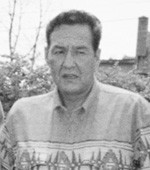Merle Marceau MA ’01 Addictions Counselor Returns to His Tribal Roots
Open gallery

It may have been the cans of beer his babysitter gave him when he was 7 to make him sleep. Or maybe it was the hopelessness he felt as a teenager with nothing to do except joyride around the reservation, siphoning gas from cars parked along the dusty streets of his Blackfeet Indian town at the foot of the Rocky Mountains.
Regardless of the cause, Merle James Marceau was drunk and drugged, and in and out of jail, prison, and a variety of treatment centers for a good portion of his teen and adult life.
Until he decided to get clean.
In 2001, less than 10 years after he tested at a fifth-grade reading level, Marceau graduated with a master of arts degree in counseling psychology from Lewis & Clark’s Graduate School of Education.
“Something kept me alive and got me educated,” says Marceau, 49, now a licensed chemical dependency counselor who works at Browning Public Schools on the northern Montana reservation where he grew up.
In many ways, the young men and women with whom he works remind Marceau of the face he once saw when he looked in the mirror. “I can relate to them because I started out the same way they did. I have been there. I have lived that life.”
Polite and unassuming, Marceau says he works to blend the best of his culture with his professional training. In addition to conducting individual and group counseling, Marceau guides talking circles. “We have elders who come in and speak in Pikanii, our native tongue, and tell us stories from long ago about our heroes,” he says.
“Merle certainly made us think as much as we made him think,” says Peter Mortola, assistant professor of counseling psychology and one of Marceau’s advisers at Lewis & Clark. “He always had a present when he came to see me—like a jar of jam from the reservation. On one occasion, he gave me a very special shirt that was used in powwows. Students aren’t supposed to give professors gifts, but I learned that, in his culture, this practice acknowledges someone’s importance.”
Mary Clare, professor of counseling psychology, calls Marceau “a person of deepest integrity and an inspiration.”
In January 1993, Marceau lay in a bed at the Portland Veterans Administration Medical Center battling pneumonia, his body worn down from a life of drug and alcohol abuse. “I was losing blood and my body was going into shock. I wanted to die. But I remembered what my grandma told me on her deathbed: ‘You were put here for a reason. Do something with your life.’”
Recently diagnosed with idiopathic pulmonary fibrosis, Marceau is facing another daunting challenge.
“My air sac linings are calcifying. The doctors have told me I have two years to live if I don’t get a lung transplant. I believe something will happen, and it will work out. I won’t give up.”
—by Dee Anne Finken
More L&C Magazine Stories
Lewis & Clark Magazine is located in McAfee on the Undergraduate Campus.
MSC: 19
email magazine@lclark.edu
voice 503-768-7970
fax 503-768-7969
The L&C Magazine staff welcomes letters and emails from readers about topics covered in the magazine. Correspondence must include your name and location and may be edited.
Lewis & Clark Magazine
Lewis & Clark
615 S. Palatine Hill Road MSC 19
Portland OR 97219

